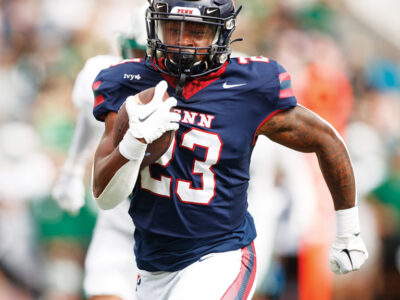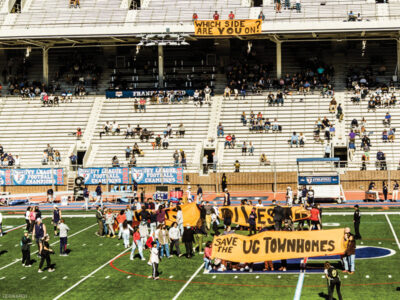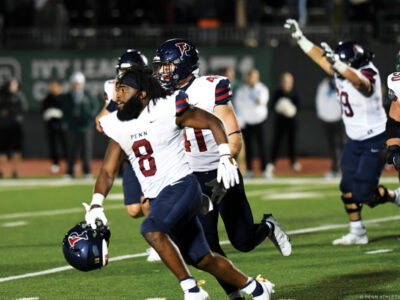When Penn head football coach Ray Priore was growing up, there was a much different mentality about practice. Often, he says, there would be three in a single day. Sometimes water would be limited, to breed toughness in players. And there would always be hitting. Lots and lots of hitting.
But with growing awareness about the long-term risk of concussions, that old-school attitude has gone by the wayside for many football teams, from the NFL down to the pee-wee leagues. And the Ivy League has arguably been at the forefront of charting a new direction.
In late February, Priore and the conference’s other seven head coaches unanimously approved a measure to eliminate all full-contact hitting from practices during the regular season—a pioneering move that garnered national headlines and could set the stage for sweeping changes in a sport beset by concussion problems. It is expected to be adopted formally as a new rule by the Ivy universities’ athletic directors and presidents at the start of the 2016 season.
“I think what we all have found is you still can play the game without being full-blown 100 percent live all the time,” said Priore, who led the Quakers to a share of the Ivy title in his first season as head coach last fall. “Things change. This is another step in that change.”
The Ivy League has been trying to reduce the incidence of concussions for several years, first limiting the number of full-contact practices in 2011. That came a year after Penn football player Owen Thomas W’11 committed suicide and was later diagnosed with chronic traumatic encephalopathy (CTE), a degenerative brain disease linked to depression and possibly caused by concussions—or, in Thomas’s case, what’s known as “sub-concussive” hits [“Gazetteer,” Nov|Dec 2010].
At the time, the league also stressed educating its student-athletes about the dangers and symptoms of head injuries, while placing an increased emphasis on data collection. Priore says that 30 percent of concussions occur when players’ heads strike the ground. That was a big part of the rationale for first reducing and then eliminating tackling from practices. Even before the new policy, the Ivy League’s limits on full contact in practice were “among the most stringent in collegiate football,” according to The New York Times.
Critics of the move have argued that Ivy League players won’t be prepared for the physical nature of games. But Priore adamantly dismissed that notion, pointing out that tackling techniques will still be taught, especially in the preseason. In fact, he says, Penn’s coaches have been teaching a tackling method in which the head isn’t used at all—a style that is thought to be safer and has been promoted by Seattle Seahawks head coach Pete Carroll.
“We’ve done it for the last two years and it’s highly effective,” Priore said. “We believe it’s helped us in a reduction of injuries. Is it hard? Sure it is. You’re going against some principles that have been there for a long time. How do you create toughness and grittiness on the field? Well, you find other ways to do those things.”
Dartmouth, whose head coach eliminated full-contact hitting from practice in 2010, has not sacrificed its competitiveness; it shared the Ivy League championship with Harvard and Penn last season.
In March, Penn took another big step in concussion awareness when the University was selected to join the Concussion Assessment, Research and Education (CARE) Consortium. The program, which is a collaboration between the NCAA and the US Department of Defense, was launched two years ago to evaluate all student-athletes at each of 30 participating schools, monitor them in the event of injury, and send all data to brain researchers.
Eric Laudano, Penn’s associate athletic director for sports performance and the head athletic trainer, credited the athletic department’s close working relationship with Penn Sports Medicine, Student Health, and the Children’s Hospital of Philadelphia, and called it a “proud moment for the league” that the CARE announcement came on the heels of the Ivies’ tackling decision.
Priore said he hopes the University and the Ivy League will continue to do whatever is necessary to keep people playing a sport that he’s always believed has been an invaluable part of the college experience.
“It’s a game we all love,” he said. “And it’s a game we want to keep safe.”
—Dave Zeitlin C’03




